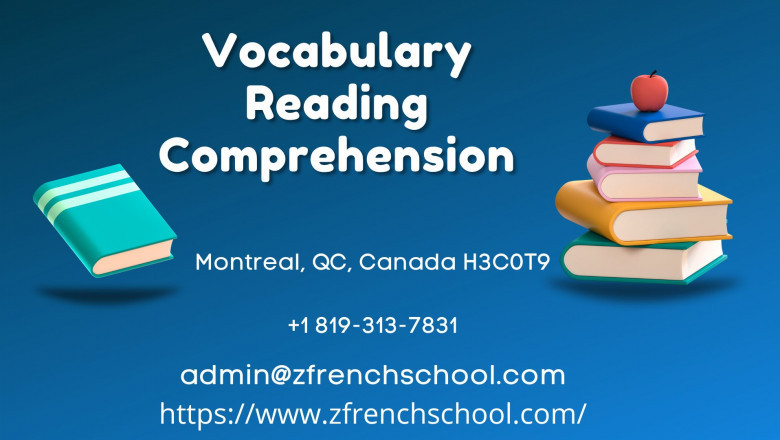views

A reader's comprehension of what they are reading is substantially aided by their use of vocabulary. The majority of the words in a work must be understood for the reader to comprehend them. Most word meanings are imparted to students indirectly through daily interactions with written and oral language. Through well-crafted education, new words are taught.

What Vocabulary Reading Entails
The words that a learner can read and understand are referred to as vocabulary reading. Students can comprehend what they read when they are more literate in vocabulary. Understanding word meanings and comprehending a tale, textbook, or other reading material are strongly related.
There are two basic ways students pick up new words:
· Indirect Learning
· Teachings
Indirect Learning
Through reading, hearing others read to them, and engaging in interactions with others, students pick up words indirectly. The majority of words that students learn get acquired through indirect means. It means that since these indirect ways will aid in their vocabulary development, it is crucial for kids especially to read, listen to others read to them, and participate in conversations.
Teaching
Words are taught to students in class and other educational settings. Doing this keeps the students growing.
Therefore, children can learn the vocabulary they need to succeed as readers through a combination of direct vocabulary instruction and indirect vocabulary interactions.
The Essentiality of Vocabulary Reading Comprehension
Vocabulary reading comprehension plays an important role in word recognition. It is not enough to read vocabulary. Comprehending the words is imperative. Vocabulary is crucial for learning to read as well as for reading comprehension, according to logic and study. Students must understand the meaning of at least 95% of the words they read in any book or section to comprehend it. Even with decoding instruction, students may not be able to understand the text well enough to learn anything from it.
Roles Of Teachers Regarding Vocabulary Reading Comprehension
The typical student needs approximately a few encounters with a word before they can recognize it in speech. Here are some concrete ways teachers might help their students' vocabulary:
· Words Read Out Loud:
These are the most popular method for introducing students to words that are difficult for them to decode. Before reading aloud, teachers should deliberately choose the terms they want to teach. Additionally, if a word tmthe students might not comprehend appears in the teacher's story and is swiftly defined, it is OK.
· Compare the new with the old.
Point out and investigate the connections and relationships between unfamiliar words and words students are already familiar with.
Others Are:
· Add fresh words to your sentences.
· Give students the chance to see, hear, read, and write new words.
· Encourage students to innovate different terms in their vocabulary.
Roles Of Parents Regarding Vocabulary Reading Comprehension
Parents tend to spend more time with kids at home and can be of help while trying to get them to learn new words. Here are ways parents can build children's reading vocabulary at home:

· Try to utilize fresh and intriguing language when conversing with your child. A fantastic method to increase your child's enthusiasm for learning words is to expose them to new terms.
The Teachers and the Parents have a significant role in helping students concerning Vocabulary Reading Comprehension. Without them, students won't be able to grab new words easily.
· As frequently as you can, read to your youngster. Select novels that are more challenging than what your youngster can read on their own. Identify and discuss any intriguing words you find in the book.
· Talk to your child about what you notice while out with the family or running errands. As you go to the grocery store, the doctor's office, and other places, teach your child new terms.
· Play a word guessing game with your child to encourage word thinking.
· Inspire your kid to read as frequently as you can. Children who read more often are likely to perform better in school and have greater vocabulary.
· Use spoken word games to help your child expand their vocabulary. Word games like Scrabble, Upwords, Boggle, etc., help kids concentrate on words.
· Your child can learn a lot of new words by learning common prefixes.
· Depending on how your child learns best, experiment with various vocabulary acquisition strategies.












